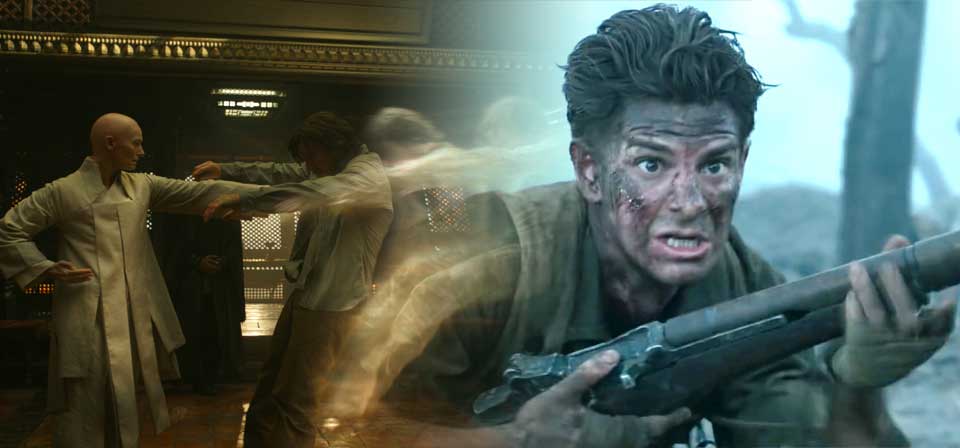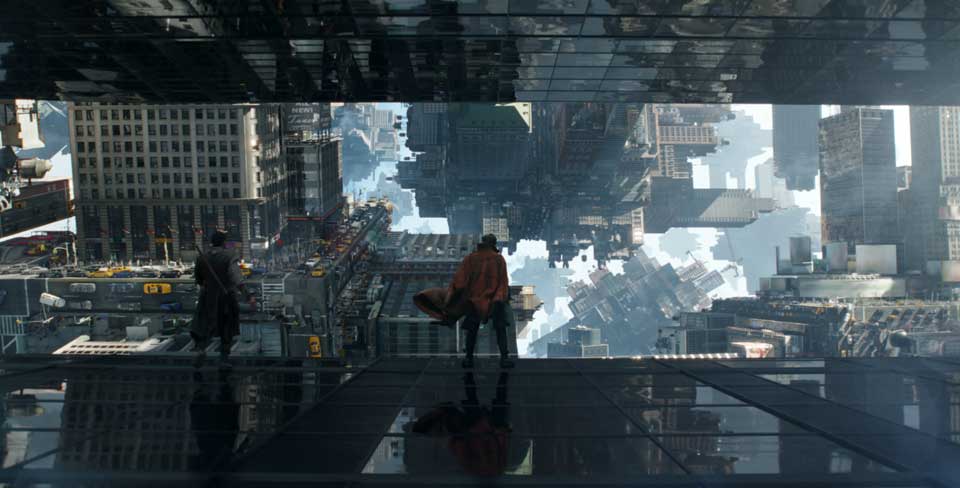Doctor Strange in the Multiverse of Madness (2022)
Six years after its release, Scott Derrickson’s Doctor Strange remains one of the best Marvel movies, and certainly one of the only cinematically interesting installments. In a franchise replete with visually dull, generic action sequences, Derrickson and company crafted a unique, kaleidoscopic visual vocabulary to express the reality-bending power of sorcery. They also gave the Marvel Cinematic Universe its best redemption-arc origin story since the original Iron Man — and, in a plot fraught with genuinely ambiguous moral and spiritual themes, set the stage for possibly the most thoughtful and interesting villain in MCU history.
There’s a scene in Doctor Strange in the Multiverse of Madness in which Doctor Stephen Strange (Benedict Cumberbatch) hastily explains about Karl Mordo (Chiwetel Ejiofor), his former ally turned mortal enemy, to a young newcomer named America Chavez (Xochitl Gomez). The catch is, they’re in another dimension of the multiverse, and the Mordo before them is not our Mordo. Our Mordo — the Mordo who said “I will follow this path no longer” and, in an ominous post-credits sequence, ambushed a paraplegic and stole the magic he used to walk, declaring that there were “too many sorcerers” in the world — isn’t in this film. So far as I know, he hasn’t been seen since that post-credits sequence.
Caveat Spectator
Fantasy/Action violence with a high body count; scary/horror images including gore and creature effects; fantasy magic with dark/occult overtones.So far as I know! I’m pretty sure I’ve kept up with all the MCU movies, but I guess it’s possible that I missed Mordo’s return in some small-screen Disney+ series. I know I didn’t see the WandaVision series, which is definitely prerequisite viewing for Doctor Strange and the Multiverse of Madness. Seriously: The whole plot of Multiverse of Madness flows directly from WandaVision, which, for me, made watching Multiverse of Madness feel not entirely unlike watching Avengers: Endgame without seeing Infinity War, know what I mean? If you’ve seen these movies, I’m pretty sure you get my drift; if you haven’t seen them, I’m positive you get my drift.
This storyline seems to have no relationship to the groundwork laid by Derrickson and his writing partners, which may explain the “creative differences” behind Derrickson’s departure from the sequel (he takes an executive producer credit). Multiverse of Madness is written by Michael Waldron (who wrote another Disney+ series, Loki) and directed by Sam Raimi, an apt choice to replace Derrickson. Not only does Raimi have solid superhero cred via the Tobey Maguire Spider-Man trilogy, his horror background (the Evil Dead trilogy; Drag Me to Hell), like Derrickson’s (The Exorcism of Emily Rose, Deliver Us From Evil), is in principle well-suited to the potentially bizarre, grotesque trappings of Doctor Strange’s sorcerous milieu.
An early set piece involving a Lovecraftian monstrosity I’m tempted to dub an “oculopod” (think Mike Wazowski crossed with Cthulu) nails the vibe of the comics and also plays to Raimi’s established strengths (I was reminded of sequences from all three Spider-Man films in connection with the physics of vertical urban action sequences involving ledges and building facades). Then there’s a goofily macabre conceit at the climax that must have been a special delight to the director of Evil Dead II and Army of Darkness. In between those two energetic sequences are some disappointingly banal visualizations of magic, including a frontal assault on the mystic stronghold of Kamar-Taj with very little of the imaginative style pioneered by Derrickson. There’s also a lot of plot turning on the trauma of Wanda Maximoff (Elizabeth Olsen), the Scarlet Witch, whose grief over the Vision’s death led (per plot summaries of WandaVision) to a mental breakdown and a horrific magical coping mechanism. It seems Wanda magically sucked an entire town into a nostalgic, utopian fantasy of her own creation, with real people forcibly assigned make-believe roles like puppets. The fantasy also included a pair of adorable sons named Billy and Tommy (Julian Hilliard and Jett Klyne) who never existed…at least, not in our universe.
A question left open at the end of WandaVision: Did the Scarlet Witch’s appalling crime against thousands of people make her a villainess? And so we come, you see, to Multiverse of Madness: What is fantasy in one universe might be real in another. In fact, we’re told that dreams are actually empirical experiences of alternate lives in other realms of the multiverse. The Scarlet Witch is obsessed with doing whatever it takes to find a universe in which her dreams of being Billy and Tommy’s mother are true — and by “whatever it takes,” I mean “murder as many people, in as many universes, as necessary,” which seems like a considerable escalation on the villainy-meter. Wanda is particularly after America Chavez, a young woman who seems to be unique in the multiverse, and has a power she can’t control of traveling between universes — the very power the Scarlet Witch wants.
Another open question, this one from the original Doctor Strange: Is Stephen himself a superhero or a supervillain?
Kwame Opam, in what now looks like a prescient 2016 piece for The Verge, argued that it was easy to see Stephen as the villain and Mordo as the hero. I didn’t go that far, but I did argue (in a piece published the same day as Opam’s) that Mordo had a point about the Ancient One (Tilda Swinton) crossing a clear moral line by stealing immortality from the realm of Dormammu, an essentially satanic being of limitless power and malevolence. While the Ancient One believed she was able to do good with her stolen power (Satan casting out Satan, as it were), Mordo plausibly argued that her transgression had led to the very threat Earth faced from Dormammu. The very lessons the Ancient One tried to teach Stephen suggest the hypocrisy of her actions: “It’s our fear of death that gives Dormammu life”; “death is what gives life meaning”; and especially “It’s not all about you.”
For what it’s worth, Derrickson expressed appreciation for my interpretation, but suggested I was being a bit narrow or rigid — like Mordo. For my part, I thought the jury was still out:
Whether this interpretation holds in the long run may depend in part on subsequent developments. For instance, if in later films Dr. Strange follows the Ancient One in drawing power from the Dark Dimension or anything similar…then Doctor Strange’s story will be compromised by something too close for my comfort to embracing black magic.
Despite our difference of opinion, I recognize that Derrickson’s Christian faith shaped the first film in various ways. I can’t help wondering what he thinks about escalations on the villainy-meter in relation to this film’s various incarnations of Stephen.
The sequel introduces two magical books: a book of seemingly limitless good magic, the Book of the Vishanti, and its antithesis, the Darkhold or Book of the Damned, which is connected to Dormammu’s Dark Dimension. Actually, the Darkhold was introduced in WandaVision, and its corrupting influence is connected to Wanda’s descent into supervillainy. We also meet versions of Doctor Strange in other realities who have been corrupted by the Darkhold.
In one universe we meet a powerful panel of superheroes called the Illuminati who consider Stephen Strange the greatest threat to the multiverse — although clearly they ludicrously underestimate the Scarlet Witch. Is it fan service to cast a popular actor as a beloved character who is meant to be among the most brilliant minds in any universe, only to have him die a massively stupid death? Sure, you can always bring him back in some other universe, but still: stupid. This isn’t the only bad call by someone who should know better — Wong (Benedict Wong) also makes a terrible call at a critical moment — but it’s the most pointless.
This is becoming a running theme in the MCU: The powers that be are at best incompetent, if not frauds or something worse. In a similar vein, although the Book of the Vishanti and the Darkhold are meant to be equally powerful, well, there’s a trope I’ve been writing about for at least 20 years but have never named. We could call it “The Dark Side Sure Seems Stronger.” (Sub-tropes could be called “Evil is Powerful, Goodness is Pretty” and “Demons Are a Lot Busier than Angels.”)
America Chavez comes to trust our Stephen, and she assures someone in another universe who, poignantly, doesn’t trust him that this Stephen is different. But is he? With respect to spoiler-averse readers, there is no way for me to do my job here without saying this much: When all is said and done in Multiverse of Madness, there is no reason to believe that any iteration of Doctor Strange, in any universe, would refrain from turning, if necessary, to the damned power of the Darkhold; from engaging in an admittedly hilarious but still disturbing form of what could be called necromancy; or even from directly utilizing the power of damned souls — malevolent spirits who, again, effectively read and function as demons.
I’m thinking of a moment in the original movie in which Stephen looks skeptically at a deeply corrupted individual nattering about the greater good and retorts, “No. I mean, come on — look at your face.” Nobody says that in the sequel, but they should.
A closing title tells us “Doctor Strange Will Return.” Having gotten to know him better than I wanted, I can’t help feeling that’s less a promise than a threat.
Related

Doctor Strange and Hacksaw Ridge: Breaking rules and the greater good
In each of their latest films, the battle against a threatening power raises questions about which principles the protagonist should or shouldn’t compromise in order to protect his world — questions that aren’t necessarily clearly answered by the end of the film.

Doctor Strange (2016)
The paradox of contemporary Hollywood blockbusters is that in our time virtually anything conceivable, no matter how wild and out there, can be put on the screen, but it almost never is.
Recent
- Benoit Blanc goes to church: Mysteries and faith in Wake Up Dead Man
- Are there too many Jesus movies?
- Antidote to the digital revolution: Carlo Acutis: Roadmap to Reality
- “Not I, But God”: Interview with Carlo Acutis: Roadmap to Reality director Tim Moriarty
- Gunn’s Superman is silly and sincere, and that’s good. It could be smarter.
Home Video
Copyright © 2000– Steven D. Greydanus. All rights reserved.